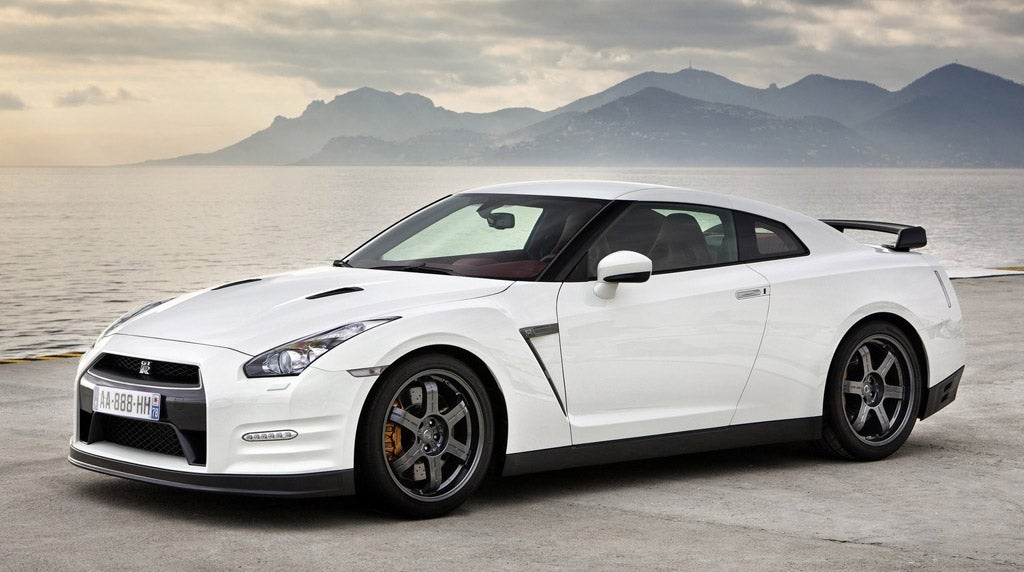 "Blunion05 drives a pink S2000 (USER WAS BANNED FOR THIS POST)" (6speedhaven)
"Blunion05 drives a pink S2000 (USER WAS BANNED FOR THIS POST)" (6speedhaven)
02/22/2015 at 20:51 • Filed to: None
 10
10
 21
21
 "Blunion05 drives a pink S2000 (USER WAS BANNED FOR THIS POST)" (6speedhaven)
"Blunion05 drives a pink S2000 (USER WAS BANNED FOR THIS POST)" (6speedhaven)
02/22/2015 at 20:51 • Filed to: None |  10 10
|  21 21 |

said the car enthusiast, who couldn't afford the car that was worth hundreds of thousands of dollars.
I believe, if you had the money to afford such an expensive car, you would possibly have the means to approach the manufacturer to make a one-off manual for yourself.
 PS9
> Blunion05 drives a pink S2000 (USER WAS BANNED FOR THIS POST)
PS9
> Blunion05 drives a pink S2000 (USER WAS BANNED FOR THIS POST)
02/22/2015 at 21:01 |
|
I believe, if you had the money to afford such an expensive car, you would possibly have the means to approach the manufacturer to make a one-off manual for yourself.
It doesn't really work that way.
 Zipppy, Mazdurp builder, Probeski owner and former ricerboy
> Blunion05 drives a pink S2000 (USER WAS BANNED FOR THIS POST)
Zipppy, Mazdurp builder, Probeski owner and former ricerboy
> Blunion05 drives a pink S2000 (USER WAS BANNED FOR THIS POST)
02/22/2015 at 21:02 |
|
Case and point:
What's purple, a supercar, and owned by an F1 driver?



The Pagani Zonda 760 LH of course.
 TheHondaBro
> Blunion05 drives a pink S2000 (USER WAS BANNED FOR THIS POST)
TheHondaBro
> Blunion05 drives a pink S2000 (USER WAS BANNED FOR THIS POST)
02/22/2015 at 21:02 |
|
Yeah, that pisses me off when people complain about cars they can't even afford.
 Blunion05 drives a pink S2000 (USER WAS BANNED FOR THIS POST)
> PS9
Blunion05 drives a pink S2000 (USER WAS BANNED FOR THIS POST)
> PS9
02/22/2015 at 21:03 |
|
Ah, so it takes a whole crap ton of money. Well, if your net worth ain't above $100 million, nobody's gettin' a manual.
 Dr. Zoidberg - RIP Oppo
> Blunion05 drives a pink S2000 (USER WAS BANNED FOR THIS POST)
Dr. Zoidberg - RIP Oppo
> Blunion05 drives a pink S2000 (USER WAS BANNED FOR THIS POST)
02/22/2015 at 21:04 |
|
And an auto, err, dual-clutch thingie in a Porsche is not comparable to say a slushbox in a Chevy Cruz.
Similarly the manual trans in my Tercel isn't even comparable to my mother's NA Miata :(
 scoob
> TheHondaBro
scoob
> TheHondaBro
02/22/2015 at 21:05 |
|
FERRARI 250 GT CALIFORN-I-A IS PIECE OF SHIT
 That Bastard Kurtis - An Attempt to Standardize My Username Across Platforms
> Blunion05 drives a pink S2000 (USER WAS BANNED FOR THIS POST)
That Bastard Kurtis - An Attempt to Standardize My Username Across Platforms
> Blunion05 drives a pink S2000 (USER WAS BANNED FOR THIS POST)
02/22/2015 at 21:05 |
|
It's actually true of lower priced cars, too. Everybody here wants manuals, everybody here wants station wagons. Even if every Jalop bought a manual RWD brown station wagon, it wouldn't be enough incentive for one manufacturer to build them. We are, unfortunately, a vocal minority.
 Jordan and the Slowrunner, Boomer Intensifies
> PS9
Jordan and the Slowrunner, Boomer Intensifies
> PS9
02/22/2015 at 21:06 |
|
What about the Ricardo from the GT? That is pretty damn proven at well over 1000nm of torque.
 Blunion05 drives a pink S2000 (USER WAS BANNED FOR THIS POST)
> That Bastard Kurtis - An Attempt to Standardize My Username Across Platforms
Blunion05 drives a pink S2000 (USER WAS BANNED FOR THIS POST)
> That Bastard Kurtis - An Attempt to Standardize My Username Across Platforms
02/22/2015 at 21:41 |
|
we definitely are a minority. It's unfortunate. We're going to be the grumpy old farts that drive manuals and the new generation of jalopnik commenters will talk about how their grampa still drives a manual in sixty years
 KusabiSensei - Captain of the Toronto Maple Leafs
> Blunion05 drives a pink S2000 (USER WAS BANNED FOR THIS POST)
KusabiSensei - Captain of the Toronto Maple Leafs
> Blunion05 drives a pink S2000 (USER WAS BANNED FOR THIS POST)
02/22/2015 at 21:50 |
|
Because the government in essence say: "FUK YUO, ZAT'S Y"
Also because costs extra money to develop and certify the model. Which goes back to point 1 about government.
 PS9
> Jordan and the Slowrunner, Boomer Intensifies
PS9
> Jordan and the Slowrunner, Boomer Intensifies
02/22/2015 at 22:03 |
|
Not at manufacturer-level R&D it isn't.
 PS9
> KusabiSensei - Captain of the Toronto Maple Leafs
PS9
> KusabiSensei - Captain of the Toronto Maple Leafs
02/22/2015 at 22:05 |
|
Reasons why the manual is going away;
Government: ~1%
People not wanting to buy manuals anymore: 99%
 KusabiSensei - Captain of the Toronto Maple Leafs
> PS9
KusabiSensei - Captain of the Toronto Maple Leafs
> PS9
02/22/2015 at 22:12 |
|
However, if one considers the fact that it is not possible to sell a powertrain combination unless the government certifies it, and even if there is a market to sell them to enthusiasts, it may not be enough units to overcome the cost to certify it and keep it within the identified market.
So instead, it's not offered. You will find there is a certain take rate below which manufacturers won't certify the manual unless there is pressure to do so from within. See, for example, Toyota and the original Lexus IS300, which got a manual, mainly because the product planners mentioned to the execs that it would not get the target market of 3-Series buyers at the time without having the option of getting a manual.
After the IS was properly established, the case no longer existed to certify it. It also doesn't exist since Lexus is in the game properly with sales numbers rivalling BMW in the US.
 DoYouEvenShift
> Blunion05 drives a pink S2000 (USER WAS BANNED FOR THIS POST)
DoYouEvenShift
> Blunion05 drives a pink S2000 (USER WAS BANNED FOR THIS POST)
02/22/2015 at 22:18 |
|

I really doubt Nissan would take that challenge no matter how much money you threw at them.
 PS9
> KusabiSensei - Captain of the Toronto Maple Leafs
PS9
> KusabiSensei - Captain of the Toronto Maple Leafs
02/22/2015 at 22:23 |
|
The government issue wouldn't be an issue at all if the take rates weren't so low, but they are. If the demand goes away, the product goes away, and right now that product is the manual transmission.
There's also something far more expensive than government certification when building a car; the sunk costs associated with heavy manufacturing. Just one car is a multibillion dollar effort requiring global talent and infrastructure. Producing a single major component requires a factory with a few hundred people staffed minimum. Government or no, if X amount of components don't need to be built per year, then there's no reason for us to build and fully staff a factory to make the thing no one wants to buy.
 Blunion05 drives a pink S2000 (USER WAS BANNED FOR THIS POST)
> DoYouEvenShift
Blunion05 drives a pink S2000 (USER WAS BANNED FOR THIS POST)
> DoYouEvenShift
02/22/2015 at 22:35 |
|
You bring up a good point — I think a globalized manufacturer (and to some extent, Porsche) does not have the time for this due to how lucrative all their other avenues of revenue are. A boutique manufacturer with exclusivity may see the appeal in having a limited quantity of an already special and rare car provided you write a check for somewhere in the neighborhood of, uh, a check with at least 7 zeroes.
 KusabiSensei - Captain of the Toronto Maple Leafs
> PS9
KusabiSensei - Captain of the Toronto Maple Leafs
> PS9
02/22/2015 at 23:06 |
|
Right, because it's not at all uncommon to sell the manual in the rest of the world and only the automatic in the US.
Your argument makes sense *if the manufacturer wasn't going to offer a manual anyways*. Example: New 911 GT3 RS. Or the Pagani Huayra. You can't get those with a manual at all. Too bad, Charlie. I'm not complaining about that scenario.
However, if a manual is offered elsewhere with the same engine combination (meaning the R&D work is already being recouped in other markets), then what keeps them from offering it, even as a BTO option (Since RoW cars and NAS cars are built in the same plants by the same people, most of the time)?
Sometimes it's company image (e.g. Mercedes-Benz), other times? Well, there are reasons why, but there's a money factor, yes, but a not-insignificant part is that our (meaning the US) crazy import laws and regulations should be harmonized with the rest of the world. And that was my whole point. That drives up the cost of doing business, and means we lose out on certain things.
 PS9
> KusabiSensei - Captain of the Toronto Maple Leafs
PS9
> KusabiSensei - Captain of the Toronto Maple Leafs
02/23/2015 at 00:07 |
|
Your argument makes sense *if the manufacturer wasn't going to offer a manual anyways*
This is completely wrong. A manufacturer can't be influenced by it's customers not buying something it was never going to put on the market in the first place.
My argument is this; Manuals are going away because people are not buying them. It really is as simple as that. For every single instance in the market here and abroad, a manual option being removed from the market has three root causes behind it; 1) Poor sales, 2) Poor sales and 3) Poor sales. Complaining about the government won't make the poor sales go away, and we can't honestly expect people who are trying to make a profit to throw that way for the sake of the manual.
However, if a manual is offered elsewhere with the same engine combination (meaning the R&D work is already being recouped in other markets), then what keeps them from offering it, even as a BTO option (Since RoW cars and NAS cars are built in the same plants by the same people, most of the time)?
Can't BTO if you're shutting down your manual transmission factory due to extremely low sales in multiple regions, and if a manual is extremely unpopular in a given market region relative to what you sell (Ours for example), then there is no business case to offer the manual at all there, not even as a BTO. It's more than just R&D; because the sunk costs associated with the global infrastructure of cars is so great, it does not make sense to use it to BTO that brown diesel manual firetruck all of 5 people are going to go down to the dealership and order without a test drive per year. Not when we can use that same time/energy/money to build something we know will sell.
 davesaddiction @ opposite-lock.com
> PS9
davesaddiction @ opposite-lock.com
> PS9
02/23/2015 at 09:17 |
|
Sad, but true.
 RX
> Blunion05 drives a pink S2000 (USER WAS BANNED FOR THIS POST)
RX
> Blunion05 drives a pink S2000 (USER WAS BANNED FOR THIS POST)
02/23/2015 at 13:16 |
|
That's because the rich people that actually buy the cars are basically
1) old, and lazy and dont care about the driving experience - pop it in auto mode
2) swinging their cock, faster and more expensive = better for showing off. Even though they wont actually drive it that way.
 samssun
> Blunion05 drives a pink S2000 (USER WAS BANNED FOR THIS POST)
samssun
> Blunion05 drives a pink S2000 (USER WAS BANNED FOR THIS POST)
03/01/2015 at 01:18 |
|
I think you're oversimplifying. There is a huge spread between, say:
- an upper middle class professional who saves and buys his 100-150k dream car for retirement
- a successful lawyer, doctor, or business owner with a couple million, and can afford a couple hundred grand for a production AMG or Ferrari
- a wildly successful F1 champion and celebrity or billionaire playboy who can casually call up a supercar CEO and have a one-off built because money's literally no object